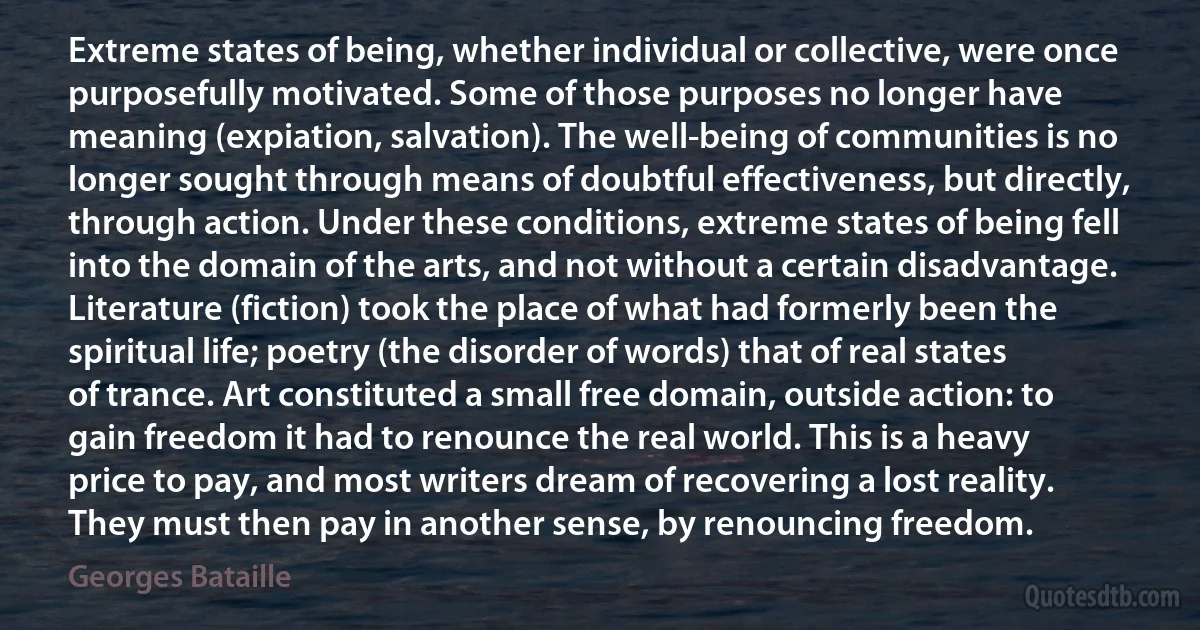
Extreme states of being, whether individual or collective, were once purposefully motivated. Some of those purposes no longer have meaning (expiation, salvation). The well-being of communities is no longer sought through means of doubtful effectiveness, but directly, through action. Under these conditions, extreme states of being fell into the domain of the arts, and not without a certain disadvantage. Literature (fiction) took the place of what had formerly been the spiritual life; poetry (the disorder of words) that of real states of trance. Art constituted a small free domain, outside action: to gain freedom it had to renounce the real world. This is a heavy price to pay, and most writers dream of recovering a lost reality. They must then pay in another sense, by renouncing freedom.
Georges BatailleRelated topics
action art certain dream effectiveness expiation fell free freedom gain heavy life longer lost meaning once outside pay place real recovering seek sense small take trance under world means words StatesRelated quotes
We ought to be able to see more clearly just for what reason the mass-man is so easily turned into a fanatic. What I seem to myself to have grasped is this, that such permeability is due to the fact that man, that the individual, in order to belong to the mass, to be a mass-man, has had, as a preliminary, though without having had the least awareness of it, to divest himself of that substantial reality which was linked to his initial individuality or rather to the fact of his belonging to a small actual group. The incredibly sinister role of the press, the cinema, the radio, has consisted in passing that original reality through a pair of flattening rollers to substitute for it a superimposed pattern of ideas and images with no real roots in the deep being of the subject of this experiment.

Gabriel Marcel
Finally, we must think big and dream even bigger. In America, we understand that a nation is only living as long as it is striving. We will no longer accept politicians who are all talk and no action, constantly complaining, but never doing anything about it. The time for empty talk is over. Now arrives the hour of action. Do not allow anyone to tell you that it cannot be done. No challenge can match the heart and fight and spirit of America. We will not fail. Our country will thrive and prosper again. We stand at the birth of a new millennium, ready to unlock the mysteries of space, to free the Earth from the miseries of disease, and to harness the energies, industries, and technologies of tomorrow. A new national pride will stir our souls, lift our sights, and heal our divisions.

Donald Trump
Thus we must carefully distinguish between two kinds of reality, one which has an individual character, and one which has a universal appearance... It is, however, wrong to think that the non-figurative artist finds impressions and emotions received from the outside useless, and regards it even as necessary to fight against them... It is equally wrong to think that the non-figurative artist creates through 'the pure intention of his mechanical process', that he makes 'calculated abstractions' and that he wish to 'suppress sentiment not only in himself but in the spectator'... It is thus clear that he has not become a mechanic, but that the progress of science, of technique, of machinery, of life as a whole, has only made him into a living machine, capable of realizing in a pure manner the essence of art.

Piet Mondrian
The chief wrong which false prophets do to their following is not financial... But the real harm is on the mental and spiritual plane. There are those who hunger and thirst after higher values which they feel wanting in their humdrum lives. They live in mental confusion or moral anarchy, and seek vaguely for truth and beauty and moral support. When they are deluded and then disillusioned, cynicism and confusion follow. The wrong of these things, as I see it, is not in the money the victims part with half so much as in the mental and spiritual poison they get. But that is precisely the thing the Constitution put beyond the reach of the prosecutor, for the price of freedom of religion or of speech or of the press is that we must put up with, and even pay for, a good deal of rubbish.

Robert H. Jackson
Even then, though, I cared about people, not theories. I had no wish to spin individual cases into some grandiose, ideologically driven legal theory. I no longer believed in utopian solutions, or the cynical politicians who used them to sucker voters, claiming to care about the poor while actually exploiting them. Not only was I sure that such solutions were doomed to failure, but I also feared that once they failed, the resulting disillusionment would make matters even worse. Yet it was taken for granted in the seventies that the purveyors of these elaborate nostrums were doing the right thing, and anyone who dared to challenge their effectiveness was hooted down. That prospect intimidated me, especially when it came to racial matters.

Clarence Thomas
